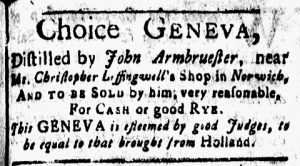What was advertised in a colonial American newspaper 250 years ago today?

“Choice GENEVA.”
John Armbruester placed an advertisement in the January 29, 1768, edition of the New-London Gazette to inform residents of Norwich and the surrounding area that he distilled and sold Geneva. Advertisers regularly promoted Geneva in eighteenth-century newspapers, either on its own, as Armbruester did, or along with an array of other spirits. Colonists certainly knew what they were being offered, but the name Geneva has largely fallen out of use today. What was Geneva?
The Oxford English Dictionary provides some clarification in its entries for gin and genever. Dutch distillers first produced a variation of gin in the late sixteenth century. This aromatic drink, flavored with juniper berries and a variety of herbs and spices, was known in Dutch as genever, but in English as Dutch gin or Hollands gin (shortened from Hollands geneva). In the middle of the eighteenth century, distillers in London produced a “less coarse, more subtly flavoured gin” that became known as London gin. That variation became the most usual form of the drink. Today consumers enjoy (London) gin in mixed drinks and cocktails, whereas genever (or jenever) is usually drunk neat.
Gin was just gaining in popularity in England at the time Armbruester distilled and sold his Geneva in Connecticut. Either he had not yet learned the process for making gin rather than genever or the demand for gin had not yet increased so significantly that he determined producing it would yield greater revenues. Whatever his reasons, the advertisement made it clear that he did indeed distill genever rather than gin. He favorably compared his “Choice GENEVA” to “that brought from Holland” rather than any produced in London, noting that “This GENEVA is esteemed by good Judges, to be equal.” In his competition with transatlantic rivals, Armbruester assured local consumers that his product was not inferior to any genever they could import from the region where it had originally been distilled two centuries earlier.
